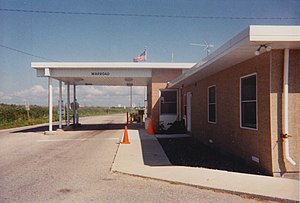Warroad–Sprague Border Crossing
| Warroad–Sprague Border Crossing | |
|---|---|
 Former US Border Station at Warroad, MN, 1998 | |
| Location | |
| Country | United States; Canada |
| Location |
|
| Coordinates | 48°59′56″N 95°22′34″W / 48.998994°N 95.376154°W |
| Details | |
| Opened | 1901 |
| US Phone | (218) 386-2796 |
| Website US Canadian | |
The Warroad–Sprague Border Crossing connects the city of Warroad, Minnesota and community of Sprague, Manitoba on the Canada–United States border. Minnesota State Highway 313 on the American side joins Manitoba Highway 12 on the Canadian side. The crossing is:
- on MOM's Way between Thunder Bay, Ontario and Ste. Anne, Manitoba.
- the easternmost along the 2,030-kilometre (1,261 mi) part of the international border that follows the 49th parallel north between the Salish Sea on the Pacific Coast and the Lake of the Woods.[1]
- used for travel between Northwest Angle and Minnesota proper. A school bus makes this journey twice daily.[2]
The adjacent Canadian National Railway track across the border, which links eastward to Rainy River, Ontario, is isolated from other US trackage.[3]
Canadian side
In 1901, the customs office opened under the administrative oversight of the Port of Winnipeg. In 1925, a new building was erected at Sprague.[4]
The customs building was replaced in 1973.[5]
US side
The Border Patrol Station was established around 1924, closed during World War II, and reopened in 1955.[6]
While on patrol near Roseau in 1928, Robert H. Lobdell, a Warroad officer, was fatally shot by an individual who had illegally entered the US.[7]
The Warroad border station, which was built in 1962, was replaced by a new facility in 2010. About one-half mile (805 m) south of the previous station, the new complex employs advanced technologies and includes two high low booths, two commercial truck docks and two enclosed passenger vehicle bays for detailed inspections.[8]
During the 2020/21 and 2021/22 winters, an ice road was built over the frozen lake to connect Northwest Angle with the rest of Minnesota.[9]
In 2022, the highway south to Roseau was designated the Richard K. Magnuson Deputy Memorial Highway in memory of the deputy sheriff who intercepted border runner Gregory McMaster in 1978. McMaster fatally shot Magnuson, the final victim of the serial killer.[10]
Traffic volumes
During earlier decades, passenger trains created much of the customs work. To expedite inspections, Canadian and US customs officers processed passengers while the trains were en route.[4] In 1930, US officers Laurence E. Doten and Lawrence C. Jones were fatally shot in the line of the duty on a westbound passenger train.[11]
The significant rail freight includes seasonal grain harvests. In later decades, highway traffic became the primary customs activity.[4]
See also
References
- ^ Jacobs, Frank (28 November 2011), "The Not-So-Straight Story of the U.S.-Canadian Border", New York Times, retrieved 13 May 2020
- ^ "School Bus Fleet". www.schoolbusfleet.com. 29 Jul 2015.
- ^ Shaffer, David (4 August 2014). "Canadian crude taking rail through northern Minnesota". Star Tribune. Retrieved 14 May 2020.
- ^ a b c Legg, Herbert (1962). Customs Services in Western Canada, 1867–1925. The Creston Review Ltd. pp. 238–239.
- ^ "Land Border Crossing Project: 47419-187064/A" (PDF). buyandsell.gc.ca. p. 76 (74).
- ^ "CBP: Warroad Station". www.cbp.gov. 11 Mar 2014.
- ^ "CBP: Robert H. Lobdell". www.cbp.gov. 30 Mar 2016.
- ^ "CBP Opening Facility in Minnesota". www.cbp.gov. 20 Feb 2010.
- ^ "Kare News". www.kare11.com. 11 Jan 2022.
- ^ "6Park News". 6park.news. 5 Apr 2022.
- ^ "CBP: Warroad Port of Entry remembers fallen Immigration Inspectors". www.cbp.gov. 10 Oct 2017.
